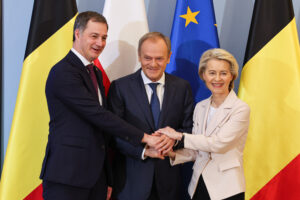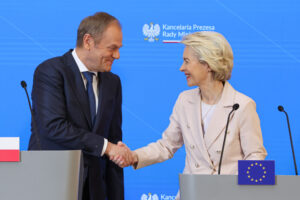Brussels – The European Commission unblocked the EU funds dossier, giving the green light to release 137 billion euros to Warsaw from the Next Generation Europe and Cohesion policy. The announcement had been expected for days, following the three-way talks last Friday (Feb. 23) between the European Commission President Ursula von der Leyen, Polish Prime Minister Donald Tusk, and his Belgian counterpart and rotating President of the EU Council, Alexander De Croo, in Warsaw.

More specifically, the Union executive issued three milestones that put Poland on track to receive 76.5 billion euros in Cohesion Policy funds and 59.8 billion from the National Recovery and Resilience Plan (NRRP), of which 5.1 billion have already arrived as pre-financing from the RePowerEu chapter after the December meeting in Brussels between von der Leyen and Tusk on the sidelines of the European Council. The first decision concerns the positive preliminary assessment of the first EUR 6.3 billion NRRP payment request, thanks to the achievement of two ‘super-milestones’ that allow – as senior EU officials put it – to “protect the financial interests of the Union before any disbursement of funds.” The green light from the Commission came thanks to the reforms on judicial independence initiated in June 2022 and completed by the Tusk government in February, in particular on the abolition of the Supreme Court Disciplinary Chamber (replaced by an independent and impartial tribunal) and the introduction of guarantees for judges so that they do not run the risk of disciplinary liability for the content of their rulings or the application of EU law (the second ‘super-milestone’ concerned the possibility of having the cases of the abolished Disciplinary Chamber reviewed).
The same EU sources point out that the new Polish government is also particularly “ambitious” on upcoming payment requests, to the point that “we expect at least one or two more this year,” bringing the country well on track for NRRP implementation “at the end of 2024.” Undoubtedly playing into newly appointed Prime Minister Tusk’s favor is the action plan presented to the General Affairs Council last week – with its “clear affirmation of the commitment to respect the primacy of EU law and the jurisprudence of the Court of Justice of the EU” – to complete all the required reforms of the judicial system. Other expected benefits for Poland should include the closure of the 2017 procedure opened by the Commission under Article 7 of the Treaty on European Union, which, if approved by the Council, could have deprived the country of its membership rights.

From left: Poland’s Prime Minister Donald Tusk and European Commission President Ursula von der Leyen in Warsaw (Feb. 23, 2024)
The second decision, on the other hand, concerns the release of funds from Cohesion Policy, Home Affairs, and Maritime Affairs programs, blocked by the failure to meet horizontal enabling conditions (the prerequisites that member states must meet to ensure the effective use of EU funds). Specifically, there are four enabling conditions – state aid, public procurement, Convention on the Rights of Persons with Disabilities, and Charter of Fundamental Rights – out of eight EU funds: European Regional Development Fund (ERDF), European Social Fund Plus (ESF+), Cohesion Fund, Just Transition Fund (JTF), European Maritime, Fisheries and Aquaculture Fund (EMFF), and the three from Home Affairs, namely the Asylum and Migration Fund (Amif), the Internal Security Fund (ISF), and the Border and Visa Management Instrument (BMVI). At this point, the Commission will be able to begin releasing requests for payments, which EU officials expect in the range of “600 million euros in the next few weeks, and then continue over the next few years, according to the timetable that Warsaw can implement.
And finally, the third decision confirming Poland’s participation in the European Public Prosecutor’s Office (EPPO), following the request sent to the Commission by the Tusk government. The candidate will have to be selected by Poland and then appointed by the College of European Prosecutors before he or she can begin – starting 20 days after today’s decision by the EU executive (i.e., March 20) – to be able to investigate and prosecute crimes committed in the country after June 1, 2021, affecting the Union’s financial interests. Sources point out that the importance of Poland’s participation in EPPO lies precisely in the amount of EU funds received by Warsaw, but also in the fact that it is now increasingly closing the circle of member states that are part of it: among those missing, is Sweden that “is preparing,” with Ireland “we are in contact to see if it is possible,” and Hungary, “if it decides to join, would be wonderful.”
The disputes between the EU and Poland
.
Since 2015, the ultra-conservative former ruling party Law and Justice has strained relations with Brussels in many respects, especially on EU standards of respect for the rule of law. Since 2021 there has been an ongoing legal dispute brought about by two rulings by Poland’s Constitutional Court: the first on July 14, when judges in Warsaw rejected the EU regulation allowing the EU Court of Justice to rule on “systems, principles, and procedures” of Polish courts; the second on October 7, when the Constitutional Court challenged the primacy of EU law, calling Articles 1 and 19 of the Treaty on European Union (TEU) and several rulings by EU courts “incompatible” with the Polish Constitution.
At the center of the dispute is the decision to provisionally suspend the powers of the Disciplinary Chamber of the Supreme Court of Poland due to several arbitrary measures against magistrates disliked by the governing majority. While the infringement procedure by the European Commission is underway, the EU Court of Justice ordered the member country to pay a one million euro fine per day: from October 27, 2021 to April 14, 2023, the bill reached over half a billion euros (526 million to be exact). In addition, there was a dispute between Warsaw and Brussels over the Turów mine. On September 20, 2021, the Court of Justice of the EU imposed a daily fine of 500,000 euros on Poland for failing to stop the operations at the mine and its power plant on the border with the Czech Republic following Prague’s complaint in February 2021. According to European judges, the mine’s operations extended until 2026 would adversely affect the water supply on the border, but Warsaw refused to pay what the ruling stipulated.
Despite closing the case on February 4, 2022, thanks to an agreement between the two governments, the EU Court of Justice decided not to revoke the fine. Therefore, a few days later, the EU Commission decided to withhold approximately €15 million from EU funds destined for Poland because of the failure to pay what the EU Court had imposed from September 20 to October 19, 2021. The standoff continued over the next year and a half of Morawiecki’s government, with the climax reached on December 10 – the same day that the national Parliament rejected former Prime Minister Morawiecki for a new term as premier – when the Constitutional Court of Poland declared the fines imposed also regarding the Turów lignite mine unconstitutional.
English version by the Translation Service of Withub






